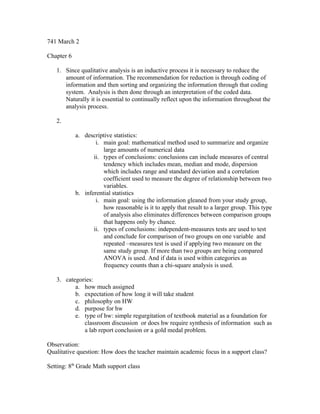
741 march 2
- 1. 741 March 2 Chapter 6 1. Since qualitative analysis is an inductive process it is necessary to reduce the amount of information. The recommendation for reduction is through coding of information and then sorting and organizing the information through that coding system. Analysis is then done through an interpretation of the coded data. Naturally it is essential to continually reflect upon the information throughout the analysis process. 2. a. descriptive statistics: i. main goal: mathematical method used to summarize and organize large amounts of numerical data ii. types of conclusions: conclusions can include measures of central tendency which includes mean, median and mode, dispersion which includes range and standard deviation and a correlation coefficient used to measure the degree of relationship between two variables. b. inferential statistics i. main goal: using the information gleaned from your study group, how reasonable is it to apply that result to a larger group. This type of analysis also eliminates differences between comparison groups that happens only by chance. ii. types of conclusions: independent-measures tests are used to test and conclude for comparison of two groups on one variable and repeated –measures test is used if applying two measure on the same study group. If more than two groups are being compared ANOVA is used. And if data is used within categories as frequency counts than a chi-square analysis is used. 3. categories: a. how much assigned b. expectation of how long it will take student c. philosophy on HW d. purpose for hw e. type of hw: simple regurgitation of textbook material as a foundation for classroom discussion or does hw require synthesis of information such as a lab report conclusion or a gold medal problem. Observation: Qualitative question: How does the teacher maintain academic focus in a support class? Setting: 8th Grade Math support class
- 2. Number of students: 32 Summary of field notes: • Students generally very talkative and • SAct difficult to get focused on the class • Teacher patient in waiting for • TSRel answers to warm ups • Called on different students for • Act warm up • Walked around room monitoring • TSRel warm up • Asked them to raise hand to answer • Pint • Let student know who was next to • Pint answer so they would be prepared • Teacher provided instructions for • Act necessary supplies; students seemed to know how to get what they needed if they did not have it already • Teacher gave instruction but warned • TSRel them that there was no handout and it was anticipated that the assignment would be done completely in class. • Teacher continually walked around • TSRel room monitoring, keeping students on task, answering questions. • Did first problem as a class so all • Mod would know what was expected. • Lesson was a group activity – • SAct students placed in groups of 4 but worked with those next to them to minimize moving around the classroom. SAct=Student activity Mod= Modeling TSRel= Teacher/Student interaction Act= Academic/social Activities Pint= Positive Verbal Interactions Analysis: Teacher struggled in the beginning of class to get students on task and focused. Teacher did not resort to threats or discipline when students were continually delinquent in getting out necessary supplies and tardy in stopping their social behaviors. Instead, she kept the focus on the tasks at hand and by doing so eventually the off task behavior diminished and the lesson proceeded rather smoothly. The teacher needed to continually monitor progress and was constantly available to answer questions and concerns about the task at hand.
- 3. Note: Follow up interviews with the teacher provided information on homework assignments for this class. As this was a support class the intent was to NOT have homework but to complete all work in class as a support to their main math class. Students had been placed in this class due to underperformance in both classroom activities and expectations and low state test scores the prior year. This meant that my initial premise for observation and interview: how was homework assigned and reviewed and what was the completion rate by the students on a daily basis, was not a valid point for observation in this setting.